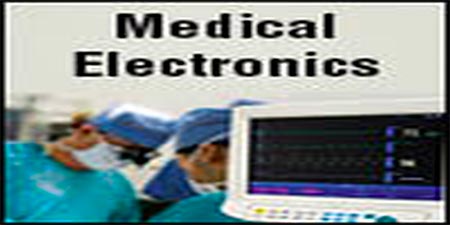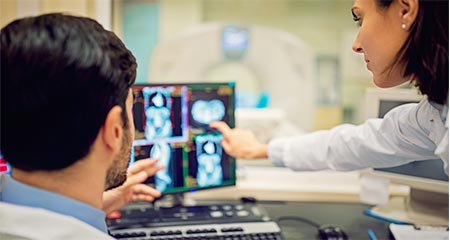Few lines about Medical Electronics
Medical Electronics is one segment of the commercial market that requires long term reliability, along with dense circuitry. The broad field of medical electronics includes instrumentation for life support, patient monitoring, hearing aids and pacemakers. The pacemaker market especially has developed rapidly and hybrid circuits along with it as the logical approach for packaging. As stated above, the restrictions in size and materials have made medical electronics a very challenging area for the hybrid engineer.
Introduction to Medical Electronics
The B.Tech/BE Medical Electronics is an undergraduate course that is divided into 8-semesters. The course involves techniques that are used in medical science such as imaging devices, patient monitors, MRI, etc, that help doctors to treat patients with controlled procedures from help of forefront technology. The course gives advanced knowledge in engineering and medicine through the different activities that integrate the course and also gives clinical practices.
The course also helps the students to improve the quality of human health and mainly focuses on understanding the complex living systems and also use different technologies. The course teaches the art and science of using modern medical equipment in the treatment of diseases. The course is about teaching students about technology and systems used in healthcare electronic devices and skills that help to design the devices.
Eligibility
The students who have passed PUC or 10+2 with a science background can join B.Tech/BE courses. The students interested in joining B.Tech/BE courses are required to qualify competitive exams like CET/COMED-K/JEE with high marks in order to get merit seats in various colleges.
Admission Procedures
The students with relevant qualifications can join B.Tech/BE courses by two modes. The first one is Merit based admission and the second one is Direct admission.
Let’s discuss in detail
Merit Admission
The students who are interested to join B.Tech/BE Medical Electronics degree should mandatorily appear for CET/COMED-K/JEE or institutional-based entrance exams and undergo counselling to choose their desired colleges for merit seats. The engineering college allots the merit seats to the students according to their rankings and marks obtained by them in their entrance exams and marks scored in PUC or 10+2.
There are two types of counselling for the B.Tech/BE students
1. Karnataka Examination Authority (KEA) Counselling
The students who are interested to join the government engineering colleges and other engineering colleges affiliated to the government should undergo the counselling procedures of Karnataka Examination Authority (KEA).
The students who intend to join for the merit seats under government quota are required to complete the counselling procedures and join for the B.Tech/BE programmes in their chosen colleges. The Engineering colleges under the Karnataka Examination Authority (KEA) are affiliated to the Visveswaraya Technological University (VTU).
2. COMED-K Counselling
The students who are interested to join the private autonomous engineering colleges and deemed universities that are affiliated to All India Council for Technical Education (AICTE) are required to apply for the COMED-K counselling procedures. The students should qualify the COMED-K counselling procedures to get admission to their desired private autonomous engineering colleges or deemed universities for Engineering programmes.
Direct Admission
The students have another option of getting admission to B.Tech/BE Medical Electronics course by direct admission process. Under this mode of admission, the students are given direct admission to their desired colleges under management quota. The direct admission students enjoy many special privileges like that they are not required to apply for any entrance exam for getting admissions. They have an option to choose their desired colleges and universities and book their seats in advance even before the starting of the academic year. The students who are interested in direct admissions are required to contact Galaxy Educational Services for more details.
Course Curriculum
The students of B.Tech/BE Medical Electronics students will be studying the following subjects during their course curriculum
| Sl No | Subjects of Study |
|
1. |
Engineering Mathematics |
|
2. |
Engineering Physics |
|
3. |
Engineering Chemistry |
|
4. |
Computer Programming |
|
5. |
Engineering Graphics |
|
6. |
Electronics Devices and Circuits |
|
7. |
Circuit Theory |
|
8. |
Transformers and Partial Differential Equations |
|
9. |
Measurement and Instrumentation |
|
10. |
Signals and Systems |
|
11. |
Digital Electronics and System Design |
|
12. |
Electronic Circuits |
|
13. |
Instrumentation Laboratory |
|
14. |
Microprocessor and Microcontroller |
|
15. |
Linear Integrated Circuits |
|
16. |
Object Oriented Programming and Data Structures |
|
17. |
Biomedical Instrumentation |
|
18. |
Control System Engineering |
|
19. |
Environmental Science and Engineering |
|
20. |
Hospital Management |
|
21. |
Principles of Digital Signal Processing |
|
22. |
Biomechanics |
|
23. |
Internet and Java Programming |
|
24. |
Medical Informatics |
|
25. |
Biomaterials and Artificial Organs |
|
26. |
Digital Image Processing |
|
27. |
Prosthetic Equipment |
|
28. |
Therapeutic Equipment |
|
29. |
Neural Networks and Applications |
|
30. |
Medical Physics |
|
31. |
Opto Electronic Devices |
|
32. |
Genetic Algorithms |
|
33. |
Computer Vision |
|
34. |
Soft Computing Operating Systems |
|
35. |
VLSI Design |
|
36. |
Diagnostic and Therapeutic Equipment |
|
37. |
Physiological Modelling |
|
38. |
Medical Expert Systems |
|
39. |
Medical Imaging Techniques |
|
40. |
Clinical Engineering |
|
41. |
Tissue Engineering |
|
42. |
DSP Integrated Circuits |
|
43. |
Total Quality Management |
|
44. |
Human Rights |
|
45. |
Nanotechnology in Medicine |
|
46. |
Speech Processing |
|
47. |
Body arena networks |
|
48. |
Fibre optics and lasers in Medicine |
|
49. |
Hospital Training |
|
50. |
Embedded and Real-Time Systems |
|
51. |
Advanced Microprocessors and Microcontrollers |
|
52. |
Computer Hardware and Interfacing |
|
53. |
Robotics and Automation |
|
54. |
Intellectual Property Rights |
|
55. |
Disaster Management |
|
56. |
Biosignal Processing |
|
57. |
BioMems |
|
58. |
Biometric Systems |
|
59. |
Telehealth Technology |
|
60. |
Medical Electronics Equipments |
Career & Scope
The B.Tech/BE Medical Electronics students are in huge demand in the industry. They are required to develop new and innovative medical equipment that are beneficial for patients.
Salary & Emoluments
The fresh B.Tech/BE Medical Electronics students will be earning around 5 lakhs to 7 lakhs per annum. The experienced professionals will be earning around 7 lakhs to 14 lakhs per annum.
Top Organisations hiring B.Tech/BE Medical Electronics students
Some of the top organisations hiring B.Tech/BE Medical Electronics students are:
- BPL
- Wipro Medical
- L&T
- Siemens
- Philips
Placement Opportunities
Some of the job roles available are:
Biomedical Engineering: The biomedical engineers are responsible for producing products and procedures to get to the bottom of medical problems. They work on biomedical electronics projects, designing, creating and evaluating systems and products such as medical equipment, artificial organs, instruments used during surgery and information systems. The majority of biomedical engineers work full-time in manufacturing, universities, hospitals and research facilities of companies and institutions. You can become a biomedical engineer by getting a bachelor’s degree in biomedical engineering or bioengineering, or you can get a bachelor’s in a related engineering field such as chemical or electrical engineering.
Biomedical Engineering Director: The biomedical engineering directors lead all functions related to safety testing, repair and maintenance of equipment and provide training and technical leadership to patient care personnel. The job typically requires an advanced degree and more than three years of managerial experience.
Medical Equipment Repairer: The medical equipment repairers install, maintain and fix patient-care equipment. They usually work during the day, but are expected to be on call during weekends and evenings. The work is often stressful as repairers may be working with vital medical equipment, sometimes urgently. Employers usually prefer applicants with an associate degree in technology or engineering. Repairers may also need a bachelor’s degree, depending on their specialization.
Biomedical Electronics Technician: The biomedical electronics technician installs, tests, calibrates and repairs biomedical equipment in addition to training users and maintaining safe operations. These techs generally work closely with electrical engineers in several settings, including factories and research-and-development laboratories. Electronics technicians usually need an associate degree to land a job.
Final Lines
There is a huge demand for B.Tech/BE Medical Electronics Engineers. They are largely required in both medical and engineering fields. They are paid handsome salaries and can expect excellent career growth in the relevant field. The students with a passion towards medical electronics can join this course.




